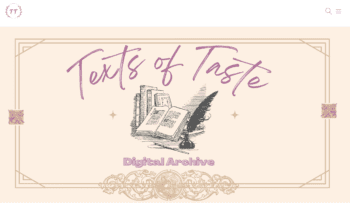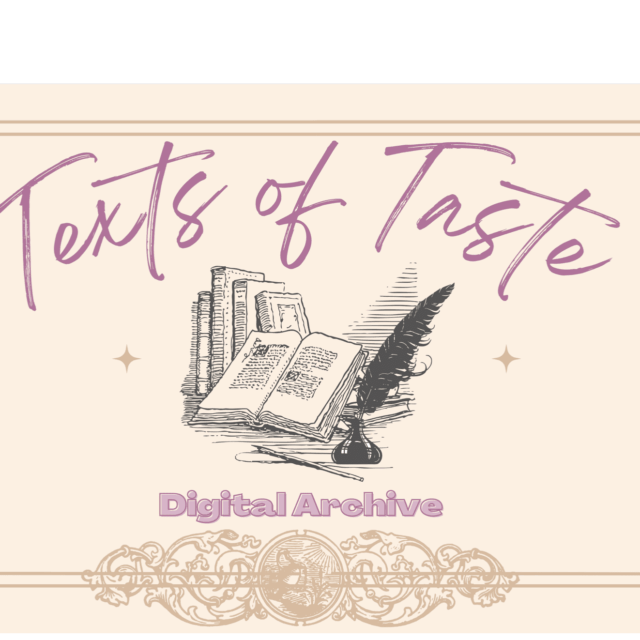On Feb 16, 2022 four NULab Seedling and Travel Grant Recipients convened at the Digital Scholarship Group’s (DSG) Digital Humanities Office Hours speaker series for an update on their ongoing projects.
The event featured research from scholars in English, History, and Political Science, all of whom delivered short lightning talks on their grant-funded project. Projects included:
The “Texts of Taste” project, presented and developed by Avery Blankenship (Department of English)
The “Mapping Social Infrastructure for Disaster and Pandemic Resilience” project, presented by Tim Fraser (Department of Political Science), and developed in collaboration with Courtney Page-Tan and Daniel P. Aldrich
The “Triangle Shirtwaist Factory Virtual Reconstruction” project, presented by Liam MacLean and Benjamin R. Grey (Department of History), and developed in collaboration with Fahim Rahman and Paul Martin
Avery Blankenship‘s Texts of Taste project was born out of a few thrift-store finds at vintage stores and antique shops and online in the early days of the pandemic. Through her efforts, Blankenship has amassed her own small collection of artifacts in various conditions and levels of damage. In her talk, Blankenship explained that these marked-up recipes and cookbooks present a prime example of women’s writing (on their own merit, as opposed to their connection to famous men) that often goes under-recognized in archives and historical accounts, and moreover is an example of the writing of common folk who deserve equal stature in historical records and scholarship. She expressed her hopes that her own interest in these everyday texts might be of interest to archivists and other researchers on nineteenth-century life who would also like to digitize and contribute their own findings.
Now a digital archive, Texts of Taste features a colorful collection of American recipes and cookbooks and spotlights annotations, markings, and everyday spills in the kitchen as valuable indicators of how cookbooks and the recipes therein were followed, adapted, and used by nineteenth-century homecooks. The Texts of Taste Digital Archive can be found at https://textsoftaste.com/. Visitors are encouraged to browse the digital collection, recreate recipes, propose exhibits, and contribute their own annotations to any of the recipes in the archive.

Tim Fraser spoke on behalf of his team about their project “Mapping Social Infrastructure for Disaster and Pandemic Resilience,” which has been a group effort from the beginning. The project was developed alongside Fraser’s fellow principal investigators Dr. Courtney Page-Tan, Embry-Riddle Aeronautical University, and Dr. Daniel P. Aldrich, Professor of Political Science & Public Policy, and supported by the hard work of masters students (Napuck Cherdchaiyapong, Winta Tekle, Erin Thomas, & Joel Zayas) and undergraduate students (Ilana Berliavsky, Ava Cervini, Olivia Feeley, Jesse Fusco, Kelly Gilmore, Jimena Marquez, Vincent Rago, AJ Ridge, and Gianna Worthington).
The goal of the Mapping Social Infrastructure project is to identify and map physical spaces in a range of cities across the United States that serve as sources of social capital, the social ties that connect residents and enable trust, reciprocity, and collective action during times of crisis. The ongoing pandemic has presented an ideal scenario from which to approach questions like these about communities and community care, and has shown the urgency of understanding local support networks.
The team began by mapping all community spaces, places of worship, social businesses (eg. coffeeshops), and parks in Boston (Suffolk County) using the Google Maps Places API tool. In doing so, they hoped to discover which neighborhoods in the city hosted more social infrastructure per capita than others. The API was extremely effective at mapping 10 types of social infrastructure, while 9 other social infrastructure-related keywords produced few results, producing blind spots. The most commonly missed types of social infrastructure were barbershops, beauty salons, recreation centers and sports fields, known to be valued community sites in some non-white communities. Together with masters and undergraduate students, the team mapped out Boston sites that could not be retrieved through the Google Maps Places API, to compare whether and how much these blind spots impacted the API’s ability to rank communities in terms of social infrastructure. They found that rates of social infrastructure based on the 10 measures found by the API closely correlated with rates based on the complete set of sites compiled by students, indicating that even when missing some sites, the API can effectively approximate levels of social infrastructure.
With the support of the NULab, the team was able to produce these measures for five more cities. To date, the project’s mapping spans 19.4 million people’s city blocks in the five biggest cities in the country: New York, NY, Los Angeles, CA, Chicago, IL, Houston, TX, and Phoenix, AZ. The sample captures 25,221 sites in total and approximately five percent of the United States population, and there’s still more to come! With the NULab Seedling Grant the team expects to complete fifteen cities total and has set its sights on Philadelphia, PA, San Antonio, TX, Dallas, TX and San Jose, CA to tackle next. Several tools for public and academic use will come out of this project.
Liam MacLean and Benjamin R. Grey presented on the “Triangle Shirtwaist Factory Virtual Reconstruction” project, which they have developed in partnership with Fahim Rahman and Paul Martin.
The overall goal of the project is to support secondary educators in their teaching about labor history by providing their students with an immersive, tangible experience for events that transpired in the early 20th century.
At the start, the project embraced virtual reality technology as a tool to recreate, spatially and experientially, the working environment and labor conditions of the Triangle Shirtwaist Factory in New York City whose fire on March 25, 1911 marks one of the deadliest workplace incidents in American history. Due to hazardous building construction and poor safety standards on the part of the factory owners, the fire severely injured and killed hundreds of immigrant and minority workers, many of them women and girls. This event, MacLean and Grey noted, later motivated the organizing and unionizing that led to labor reform and new standards for workplace safety.
However, their goals have shifted slightly as they continued their work on the project. MacLean and Grey now described their goals in this way:
- To dehistoricize the Triangle Shirtwaist Factory Fire and challenge the narrative that OSHA “fixed” the issue. Instead, MacLean and Grey offer up an understanding of the fire as part of an ongoing struggle for workplace safety and reform still present in the United States today.
- To discuss the Triangle Factory Fire alongside similar workplace incidents in recent years, in order to establish a new historical narrative that captures workplace reform as a trend in United States history.
- To provide an immersive tool for students to “experience,” through virtual reality, the environment and workplace.
The project is currently in the pilot phase, which the two displayed for attendees during their lightning talk. But, in the future MacLean and Grey hope to launch the project online for widespread use as a pedagogical tool.
The final speaker and grant recipient Chris Parsons was unfortunately unable to attend the event. Read more about his project, Visualizing the 1721 Epidemic.
Do you have a project in need of support? The NULab is once again inviting proposals for seedling grants, travel, and co-sponsorship of events related to digital humanities and computational social science. Read the Spring 2022 NULab Seedling and Travel Grants Call for Proposals here. Apply by March 15, 2022.
The DSG’s DH Office Hours events will continue on Wednesday 12pm–1pm. Register to attend any of the upcoming events here.







